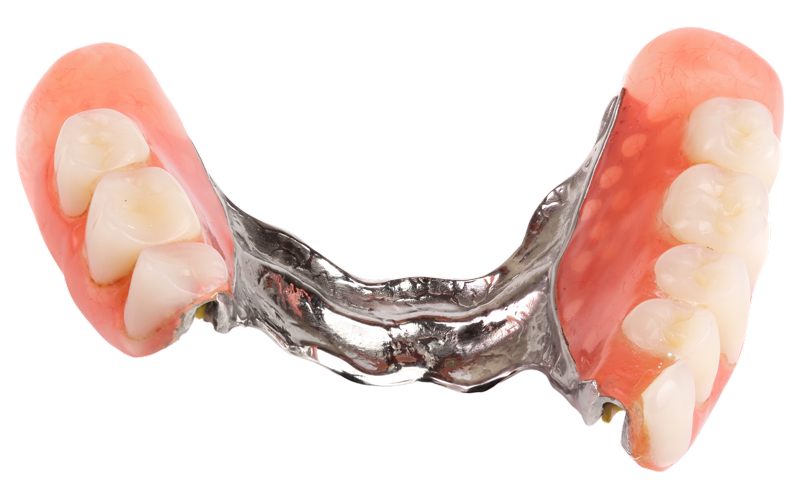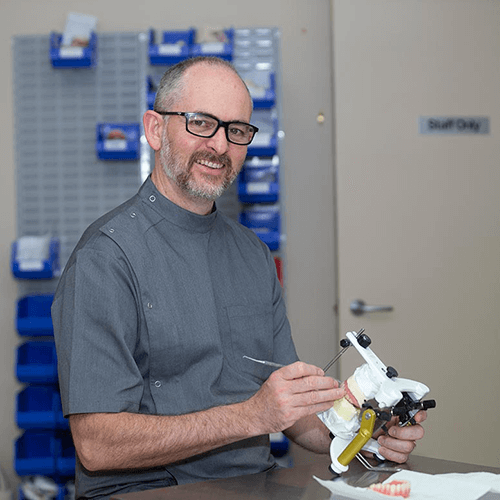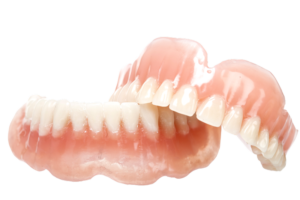What Is a Dental Prosthetist? 24 Oct 2021 4:20 PM (3 years ago)
“When you are placed in the care of a dental prosthetist, you can be secure in the knowledge that you’re being looked after by a dental practitioner with the most comprehensive knowledge of advanced techniques, new materials and the latest world trends in the field of dental prosthetics.”
Wondering what a dental prosthetist does? Or perhaps you’ve wondered who you should see for your denture concerns: a dentist or a dental prosthetist. Both are registered, independent practitioners working in the dental industry. However, their focus and skill sets are different – as are their services.
A general dentist cares for conditions in your mouth, teeth, jaws and gum. They are the go-to professionals for oral examinations, x-rays and diagnosing dental diseases. Dentists perform various treatments such as tooth extractions, fillings, restoring teeth with crowns, treating gum disease and much more.
A dental prosthetist is the ideal person to see if you wear dentures or you need a mouthguard. The ADPA (Australian Dental Prosthetists Association) states that dental prosthetists work as independent practitioners in the assessment, treatment, management and provision of removable dentures and flexible removal mouthguards used for sporting activities.

Dental prosthetists (DPs) don’t just make devices, though. They are also qualified to take impressions and records required to manufacture different splints, snoring devices and immediate dentures. Such procedures require written referrals to and from dentists. Any device being created under such an arrangement must be managed by a treating dentist.
To train to become a dental prosthetist, an individual must first become a dental technician. This requires two years’ tertiary training. Then, they must do further extensive study in dental prosthetics. If they complete their studies successfully, they can then qualify and become registered as a dental prosthetist.

Benefits of seeing a dental prosthetist
Health insurance & other rebates
If you have health insurance, you may be able to receive rebates for certain denture services provided by a dental prosthetist. Medicare and the Department of Veterans Affairs may also give you benefits or rebates.
Denture wearers
If you wear dentures, a dental prosthetist is the ideal professional to see as they are highly skilled in assessing you and catering for your needs. Dentures and oral prosthetic devices are all they do, day in, day out.
If you wear dentures, approximately every 5 to 7 years, you’ll need a new denture or set – which is something your DP can provide. They will assess your mouth, take impressions, discuss the recommended materials for your denture and any budgetary limitations or preferences. They can then make and fit your denture. This will all happen under one roof without having to have repeat appointments at a dental clinic, where you’ll be under the care of more than one practitioner.
Denture relines
In between purchasing new dentures, you’ll likely need a reline. A denture reline is an essential service that involves tweaking the denture to ensure it continures to fit well and remains comfortable. As time passes, our bones and gums change shape. This means that your denture that once fit well is likely to not fit so well over time. Your DP can reshape the underside of your denture to ensure an improved fit that is more comfortable while resting against your gums.
Denture repairs
Broken or damaged your denture? Repairs are another reason to see a DP. Rather than visiting the dentist, who will likely hand your denture to their technicians, a dental prosthetist has the tools, experience and expertise to repair your denture themselves.
Mouthguards
If you or your child plays contact sports, it’s essential you, or they wear a custom sports mouthguard. Custom mouthguards are far superior to boil-and-bite mouthguards available over-the-counter at pharmacies and shops. A custom mouthguard provides far more protection to your teeth, absorbing the impact and preventing damage to the jaw or teeth. A dental prosthetist is to go-to professional to create a custom mouthguard for your needs. Health insurance rebates may also apply.
Choosing a dental prosthetist
Now that you know what a dental prosthetist does let’s take a look at how you should choose one. Here are a few questions to think through:
- Will my denture/s be made on-site? At Morley Denture Professionals, everything is created on-site. We don’t outsource any manufacturing, relines or repairs to overseas/interstate companies or technicians.
- What materials are you using? Dentures can be made of various materials. Some are more expensive than others. Make sure you know what you’re getting and the pros and cons of the type of material you choose.
- Who is creating or relining my denture/s? Do they have adequate experience? Bradley has been in the dental profession for 35 years and has worked as a dental prosthetist since 1994.
Morley Denture Professionals serve patients throughout the Perth metro area, especially those in Morley or the surrounding suburbs of Dianella, Bassendean, Bayswater, Embleton, Mount Lawley, Yokine, Inglewood, Beechboro and Maylands.
The post What Is a Dental Prosthetist? appeared first on Morley Denture Professionals.
How to Clean Your Dentures 28 Sep 2021 10:08 PM (3 years ago)
Just as your natural teeth need cleaning twice a day, so do your dentures. But that doesn’t mean you should clean them the same way. In this article, we look at how to clean your dentures, along with answering a few common questions about stains, bleach, cleaning products and other teeth cleaning concerns.

Do not use toothpaste to clean your dentures as it is too abrasive.”
DENTURE CLEANING INSTRUCTIONS
We provide all of our patients with a unique denture-cleaning brush to look after their dentures.
- Remove denture from your mouth
- Brush your dentures daily with your denture brush or a soft-bristled toothbrush with soap and water
- We do not recommend using toothpaste on your denture as this can be abrasive
- You may wish to soak your denture in a commercial denture solution/tablet 2-3 times per week.
All denture wearers must clean their dentures and any remaining natural teeth twice daily. Whether they are full or partial, have a soft liner, or are implant-retained, all dentures will develop a film of plaque after being in your mouth. To remove plaque and clean your dentures (false teeth), use a denture brush, warm water and basic hand soap such as Velvet or Dove soap. Alternatively, use an affordable liquid hand wash.
Do not use toothpaste to clean your dentures as it is too abrasive. Dentures are not as hard as your natural teeth and toothpaste contains tiny, abrasive particles that can break them down and make them too porous. Once this happens, they are prone to staining or yellowing.
Toothpaste does leave a fresh, minty taste in your mouth, so we can understand the appeal. So use toothpaste with a soft toothbrush to gently massage your gums and clean any remaining natural teeth you may have. This will keep your gums and remaining teeth healthy while giving you that clean, minty taste.
How to clean dentures when you have oral thrush
Oral thrush (candida) is a yeast infection. It can be a common problem with denture wearers, particularly if you’ve been on antibiotics. The symptoms of thrush include white lesions on your inner cheeks, tongue, gums, tonsils or even on the roof of your mouth. Your mouth may also be red and sore, making it difficult to eat or swallow. Usually, it’s not a severe problem, but you need to treat your thrush by cleaning both your both and denture/s using a specific antifungal product so the thrush doesn’t linger. If you think you may have oral thrush, call the clinic. Bradley will likely put you on a specific cleaning protocol, including using an antifungal mouthwash such as Nilstat.
How to remove stains from your denture
No one wants to have yellow teeth. If your denture has become stained due to certain medications, drinking tea, coffee or red wine and eating various foods, you can have these stains removed. The best way is to bring them into the clinic for professional ultrasonic cleaning. Ultrasonic cleaning will remove any stains and get them looking near-new again. Ultrasonic cleaning will also remove any calcium deposits. Also, a calcium buildup can interfere with the fit of your denture, making them uncomfortable. We recommend an ultrasonic cleaning approximately every 18 months.
Can I clean my dentures with lemon juice?
Yes, you can use lemon juice to clean your dentures. Lemon juice will help bleach the dentures and make them appear whiter. Simply squeeze the lemon juice (straight – not diluted with water) onto the dentures and start cleaning.
Can I clean my dentures with bleach?
Although bleach is a renowned stain remover, we don’t recommend that you use it on your dentures. The best way to bleach your dentures is by using lemon juice or bringing them into the clinic for an ultrasonic clean.
Can I use a denture-cleaning tablet?
Some people prefer to soak their dentures in a solution of water and a dissolved denture-cleaning tablet such as Polident. We suggest you do this once or twice a week. However, you must brush your dentures first, using soap (as outlined above) to remove the microfilm. Then, the tablet can do its work!
Help – my dentures fell in the toilet!
If you’re wondering how to clean your dentures after they have fallen in the toilet, you’re not alone! Around 30 Australians a month report this problem. Once you’ve salvaged your teeth from the toilet bowl, you’ll need to destroy any germs, but this can be achieved by brushing with soap and warm water. You don’t need anything fancier than that. Soap can remove dirt or bacteria by clustering around any droplets in a circular wheel called a micelle. Do this as soon as possible and you should have nothing to worry about – providing you haven’t chipped or broken your denture in the process!
Have any questions about denture cleaning?
Morley Denture Professionals serve patients throughout the Perth metro area, especially those in Morley or the surrounding suburbs of Dianella, Bassendean, Bayswater, Embleton, Mount Lawley, Yokine, Inglewood, Beechboro and Maylands.
The post How to Clean Your Dentures appeared first on Morley Denture Professionals.
Lower Suction Dentures (SEMCD) by Prof Jiro Abe 8 Mar 2021 8:00 PM (4 years ago)
A world-first construction technique to create stable lower dentures
Loose lower dentures have long been a problem for denture wearers. For years, dental professionals have tried, without great success, to create a denture that will cover and firmly hold onto the lower gum tissues. Now, with the invention of Lower Suction Dentures (SEMCD) this problem has been remedied.
Prof Jiro Abe, a dentist and prominent name in the international denture industry, successfully created this advanced denture construction technique to stabilise the lower denture in 1999. Named the Suction Effective Mandibular Complete Denture, it has now achieved worldwide popularity. His method involves a precision impression technique, using a custom-made oral template for each patient to carefully map the sealing mechanism of the lower jaw. This level of detail allows for optimal recording of all necessary anatomical information to reconstruct a perfectly fitting denture.
The Suction Effective Mandibular Complete Denture is a treatment suitable for individuals with no lower teeth who require a stable denture to function in their daily lives.
To achieve the best possible suction mechanism, Morley Denture Professionals adopt this advanced technique when creating all our BPS dentures and have had outstanding results. Our patients have been extremely happy with the outcome and have been recommending it to all of their friends.
The post Lower Suction Dentures (SEMCD) by Prof Jiro Abe appeared first on Morley Denture Professionals.
The Bio-functional Denture System (BPS®) 4 Feb 2021 10:52 PM (4 years ago)
The finest in aesthetics, function, longevity, fit & comfort + a 2-year warranty.
Morley Denture Professionals are one of the few clinics in Australia to become BPS® certified.
The Bio-functional Denture System (BPS®) is an advanced, multi-faceted denture system that produces one of the most superior dentures you can buy. It was created to help dental professionals make a better performing, more lifelike (and aesthetically pleasing) denture than conventional dentures. And, it was created to produce a stronger, longer-lasting denture.
No other Australian denture comes close to the superior results of a BPS® product. Here’s what you can expect:
Aesthetics
BPS® makes you look better. Your dentures are designed specifically for your facial structure. We use the latest tools and instruments to take accurate impressions of your teeth, jaw and mouth, giving you a far more natural (and youthful) appearance.
Function
Expect vast improvements when eating, talking and smiling. Due to both materials and manufacturing techniques, BPS® dentures function more like natural teeth.
Lifelike feel
BPS® dentures feel more lifelike in the mouth due to the materials, design and construction.
Durability & longevity
BPS® produces dentures far stronger, durable and long-lasting than any others on the Australian market, which is why we offer a 2-year warranty.
Comfort
The seamless construction process makes BPS® dentures far more comfortable than their conventional counterparts.
Healthy
BPS® dentures are produced using high-impact, injection-moulded acrylic resins, making them a healthier choice for long-term denture wearers.
The only Australian denture with a 2-warranty
The BPS® system dentures are the only dentures that come with a 2-year warranty. And as mentioned, we believe they are the most lifelike and functional dentures. This is due to several contributing factors in the manufacturing process:
Instrumentation – Using advanced instruments, all facial information is carefully recorded to mimic your smile character and restore the natural contour of facial muscles and lips.
Premium SR Phonares II & SR Vivodent SPE denture teeth – These lifelike teeth mimic your natural teeth using advanced tooth moulds with certain “bold” or “soft” characteristics. These characteristics are further broken down into youthful, universal or mature characteristics. We create the teeth to appear like natural teeth, with an incredibly lifelike blend of opalescence, translucence and fluorescence.
Advanced manufacturing equipment – The way your denture base is made contributes significantly towards how well it fits and functions. Poor fit leads to discomfort and irritation. Alternatively, this denture is harder, denser, more robust and better fitting, due to an advanced continuous heat injection system. It is also less prone to staining and odours.
Morley Denture Professionals serve patients throughout the Perth metro area, especially those in Morley or the surrounding suburbs of Dianella, Bassendean, Bayswater, Embleton, Mount Lawley, Yokine, Inglewood, Beechboro and Maylands.
The post The Bio-functional Denture System (BPS®) appeared first on Morley Denture Professionals.
